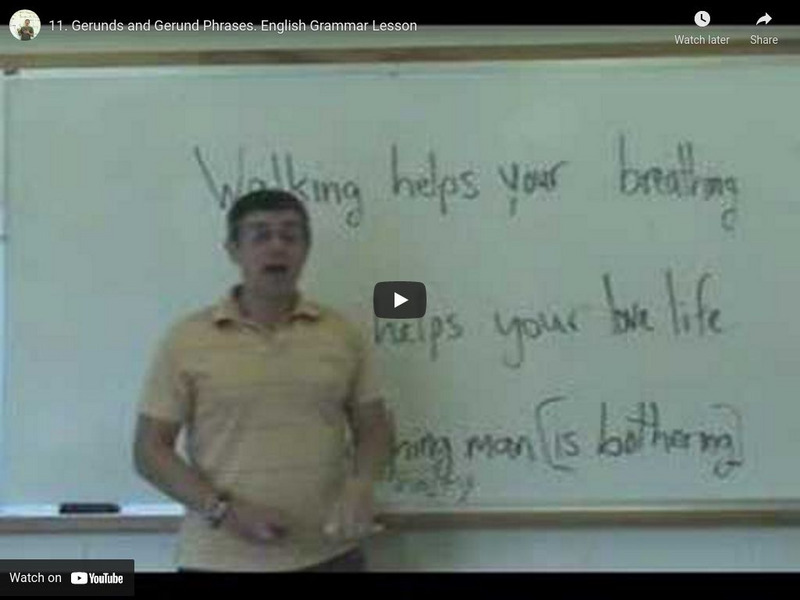Curated OER
Active Voice and Passive Voice
Identify the subject of the verb and the agent (whatever is doing the action), and you will be able to discern if your sentence is written in the active or passive voice. Yossarian the Grammarian demonstrates by writing examples of each...
Ereading Worksheets
Types of Pronouns | Parts of Speech App
Get ready for an abundance of information with a video all about pronouns! Go beyond subject and object pronouns to study different types of pronouns—personal, demonstrative, indefinite, reflexive, interrogative, possessive,...
Curated OER
IELTS Writing Essays 6
Be more persuasive with these strategies! Specific to the IELTS essay, Robert Lewis talks about persuasive techniques, such as using reason and appeal to authority, and how to apply them to your writing.
Curated OER
More on Restrictive Elements and Punctuation
Continue your look at restrictive and non-restrictive clauses and the use of commas with Yossarian the Grammarian. Non-restrictive means that no new information is being added to your sentence, therefore commas are necessary.
Curated OER
Indirect Objects and Objective Complements
Start by looking at the main action to discern what the direct object is. The indirect object does not receive the action, but is related to the direct object. Furthermore, the objective complement is displayed where the direct object...
Curated OER
Participial Phrases and Participles as Adjectives
Participles can be part of a verb phrase (participial phrase) or act as an adjective. Yossarian the Grammarian demonstrates how the verb "to wear" functions differently in various sentences.
Curated OER
Transitive Verbs and Direct Objects
Yossarian the Grammarian shows us that transitive verbs have a direct object, while intransitive verbs do not. Sentences are written out to illustrate his point.
Curated OER
What a Verb Is, and What Verbs Aren't
How do you define a verb? A verb has a subject. It is not always accurate to just look for the action. Using a complex sentence written on a whiteboard, Yossarian the Grammarian points out the possible verbs that people see, and what the...
Curated OER
Punctuation Basics - Restrictive and Non-Restrictive
Commas have many different functions: they combine items in a list, set off nonrestrictive clauses, and more. The restrictive clause is comprehensively covered by Yossarian the Grammarian.
Curated OER
Halt! Whom Goes There? - Pronoun Case, Continued
Pronoun cases are continued, focusing on the times to use who or whom. As long as you know what part of speech each is functioning as, there is no longer any confusion. Yossarian the Grammarian adeptly explains this concept.
Yossarian the Grammarian
Gerunds and Gerund Phrases: English Grammar Lesson
This video lesson from Yossarian the Grammarian explains what gerunds are. He also explains how gerunds function in a sentence. [5:16]
Yossarian the Grammarian
Dependent Clauses: English Grammar Lesson
This video lesson from Yossarian the Grammarian explains the following dependent clause types: noun clauses, adjective clauses, and adverb clauses. [8:16]
Yossarian the Grammarian
"Halt! Whom Goes There?" Pronoun Case, Continued: English Grammar Lesson
This video lesson from Yossarian the Grammarian explains how to determine which pronoun case is needed.
Khan Academy
Khan Academy: Irregular Plural Nouns Foreign Plurals
You don't need to know how to speak Latin and Greek in order to understand English, but some words in English come from those languages. It's helpful to know how some Greek and Latin words change from singular to plural.
Khan Academy
Khan Academy: Irregular Plural Nouns the Mutant Plurals
English has seven words that behave very strangely when you change them from the singular to the plural. These are called THE MUTANT PLURALS of English. They're super cool.
Yossarian the Grammarian
English Grammar: What Adjectives Are
This is a YouTube video lesson about adjective. Adjectives modify nouns and answer the questions: Which? What kind of? or How many?

















